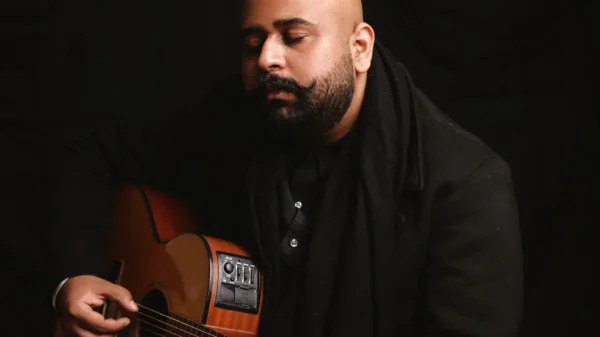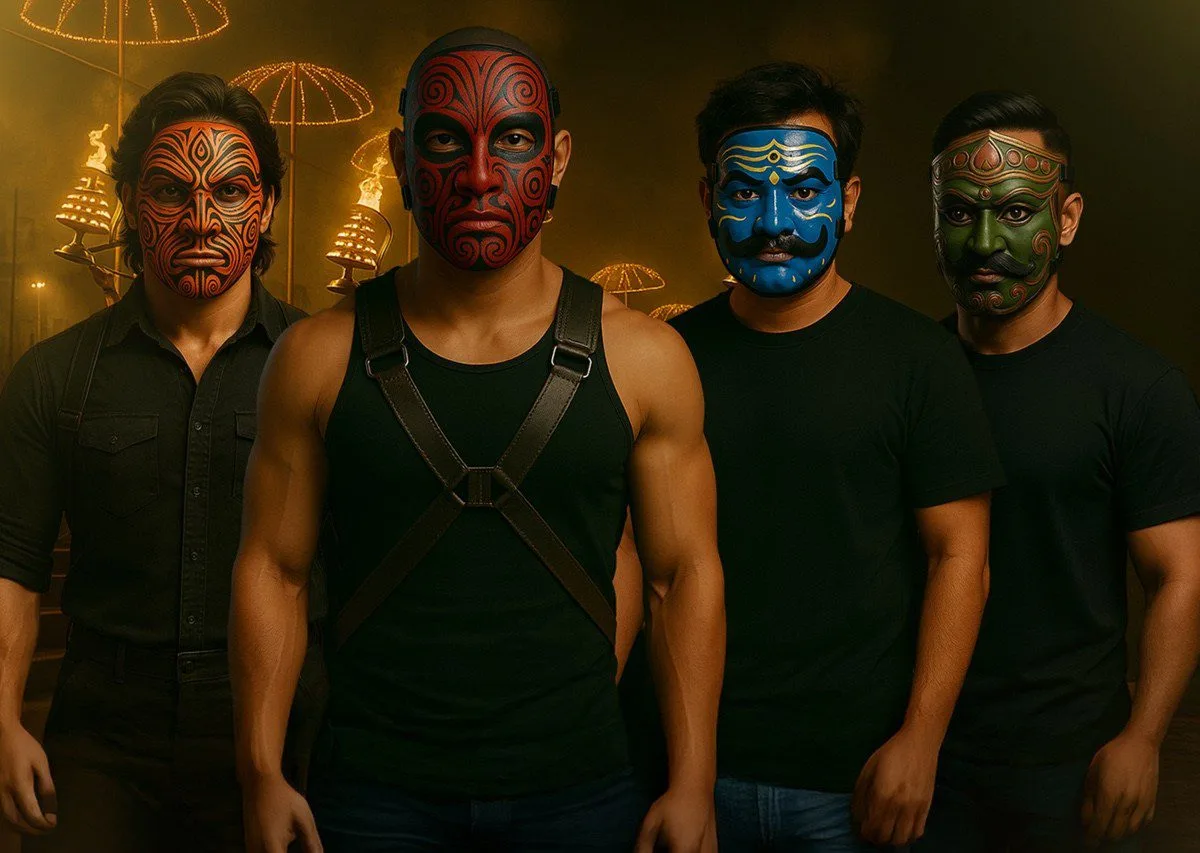To add to the already cluttered news cycles filled with opinions around AI-generated music, last week, the artist management agency, Collective Artists Network, announced “India’s first Spiritual Rock Band”, called Trilok. This marks India’s first major entry into the mysterious world of music groups created using AI tools like Suno and Udio.[1]
“Mysterious” might also be the right word to describe how these AI models function and how they ingest and process massive volumes of data. The inner workings of these Large Language Models (LLMs) remain a black box. Courts around the world are now scrutinizing how AI systems gather and learn from data. As the legal debate unfolds, it’s time to break down the complexities and understand what’s really at stake.
HOW BIG IS THIS?
Last month, the world discovered “The Velvet Sundown”, a band with over 1.3 million monthly Spotify listeners. Despite initial resistance from its creators, it quickly became clear that the main creative and intellectual work – its music, members, and branding – was done using AI.[2] The Velvet Sundown joined the ever-growing list of AI artists like “Aventhis” (1 million monthly listeners) being fed into the music ecosystem. In fact, Music Business Worldwide identified at least 13 similar AI bands flooding streaming services.[3] Some estimates say 20% of all music on DSPs like Spotify is AI generated / assisted.[4]
Some platforms are taking steps to discourage this trend. Recently, Deezer launched its patent-pending AI detection tool which will remove 10,000 AI generated tracks uploaded daily on the platform from its algorithmic recommendations. [5]YouTube is also updating its rules. [6]It will no longer allow monetization for content that is mass-produced or repetitive, much of which is made using AI. Even with these steps, the market is still expected to shift heavily toward AI. Some reports estimate AI music will be worth around 18 billion USD by 2028, leading to a total loss of around 4 billion USD to musicians in that year alone[7].
WHO OWNS MUSIC GENERATED USING AI?
To summarize, the current law in India does not recognize AI as an author. Courts have consistently held that authorship must belong to a human. As of now, ownership of AI-generated music is mostly governed by the terms of use of each platform.
- Suno, for instance, allows commercial use under its premium plan and grants users an exclusive license for it. But for music created on its free plan, Suno retains ownership[8].
- Udio, on the other hand, permits both personal and commercial use[9].
- India’s own AI music platform, Beatoven AI, takes a more restricted approach. It allows music created on its platform to be used only as background for content like videos, podcasts, or games. Users are not allowed to upload or perform these tracks as standalone works on streaming platforms like Spotify.[10]
This patchwork of rules creates confusion. There is no consistent legal position on ownership, licensing, or commercial rights. To address this, India will need to either amend its existing copyright law or introduce a new, AI-specific legal framework. The first steps have already been taken, with the Ministry forming a committee to study how AI intersects with copyright in India.[11]
WHAT ARE THE COURTS SAYING?
While courts around the world are dealing with many aspects of AI, one of the most important issues to follow is whether AI platforms can use copyrighted works to train their models under the exception of “fair use”. In India, this is referred to as “fair dealing”. To put it simply, Fair Use allows the utilization of copyrighted work without a license or permission if used for purposes like news, teaching, criticism, or research. Whether something is fair use depends on factors like purpose and nature of use, amount used, and impact on the original work’s value.
Three major decisions from lower courts in the US have addressed this issue, but the legal position still remains unclear. While a full reading of the judgments reveals important nuances, here is the simplified version:
- In the lawsuits against Meta and Anthropic, the courts held that training LLMs using copyrighted content is fair use.
- However, in the case against ROSS Intelligence, the court ruled that it was not fair use. All three decisions are likely to be challenged in the US appeals courts.[12]
In addition to the decisions around fair use, there have been lawsuits against AI music platforms like Suno and Udio. A major case was filed in June 2024 by Universal, Sony, and Warner, wherein the labels accused both platforms of mass copyright infringement. [13]This is also the dispute where Suno and Udio admitted that their models were trained on recordings likely owned by the plaintiffs, i.e. copyrighted music[14]. Their defense is also based on the argument that training LLM on copyrighted work is fair use.
The latest major news on this dispute was that despite accusing the AI platforms of mass copyright infringement, the labels are now reportedly in talks to license their music catalogs to Suno and Udio. According to Bloomberg, the labels are negotiating terms that would give them a small equity stake in these companies in exchange for licensing access, similar to the early arrangements made with Spotify.[15]
In India, the major lawsuit around use of copyrighted work by AI is one where the news agency, ANI, has sued OpenAI for unlicensed use of its copyrighted content for training its AI chatbot. [16]OpenAI has said that it is not obligated to enter into partnerships to use their publicly available content [17].
On the policy side, the UK is deliberating an “Opt-out” policy for training AI models. This policy will give the right to AI platforms to use copyrighted work by UK authors to train their models, unless the authors go through the trouble of opting out themselves. This policy can have a huge impact on the power dynamics between AI companies and the creator industry.
WHY THESE DECISIONS MATTER
If fair use is allowed for AI training, we may see a flood of AI-generated content across artforms. This content is fast, cheap, and easy to scale. For uses that may not particularly need music with a strong artistic personality – including ad music, diegetic sync, or stock visuals, companies would prefer going for AI over human creators because of its efficiency and how much time and money it can save.
This shift could push artists out of large parts of the creative market. Mid-level creators and freelancers may lose steady work. What was once a space for personal expression may become dominated by formulaic clutter. As AI tools become better at replicating known styles, the lines between original work and imitation may blur. This could dilute the unique value of an artist’s voice or identity, especially when their style is used without consent or context.
Copyright legislation aims to incentivize originality and the artist’s will to create original work. If you take away this incentive and protection, the world of art becomes much more daunting than it already is for creators. In this context, it is important that the artist community engages with the current policy and legal decisions, which will impact the sustainability of their careers.
It is also imperative to tread with caution while using AI-generated music. Policy and legal landscapes are actively shifting. Regulatory bodies are still deciding whether AI training and output violate copyright. So, music that seems safe to use today could face legal challenges or liability in the future, especially if it was trained on or resembles protected works.
To conclude: It has become quite apparent that the new tide of AI bands / musicians is not settling down anytime soon. AI, as a technology, has the potential to cause disruption across all industries at a scale not seen before. Therefore, it would be wise to get informed on how it’s going to change our lives forever.
Author’s note: This article was researched and written by the author and edited using OpenAI’s ChatGPT.
Disclaimer: This article is for informational purposes only and does not constitute legal advice. For any specific legal questions or concerns, please consult a qualified legal professional.
[1] https://www.instagram.com/p/DL1oLJZP5l9/
[2] https://people.com/rock-band-velvet-sundown-ai-generated-including-musicians-1-million-spotify-listeners-11769532?utm_source=chatgpt.com
[3] https://www.musicbusinessworldwide.com/that-ai-artist-with-over-1m-listeners-on-spotify-his-music-was-created-with-suno-says-expert-report/
[4] https://www.cisac.org/services/reports-and-research/cisacpmp-strategy-ai-study
[5] https://newsroom-deezer.com/2025/01/deezer-deploys-cutting-edge-ai-detection-tool-for-music-streaming/
[6] https://support.google.com/youtube/answer/10008196?hl=en
[7] https://www.cisac.org/services/reports-and-research/cisacpmp-strategy-ai-study
[8] https://suno.com/terms
[9] https://www.udio.com/terms-of-service
[10] https://www.beatoven.ai/tos
[11] https://www.medianama.com/2025/05/223-india-ai-copyright-law-committee/
[12] https://chatgptiseatingtheworld.com/2025/06/26/12026/
[13] https://www.riaa.com/record-companies-bring-landmark-cases-for-responsible-ai-againstsuno-and-udio-in-boston-and-new-york-federal-courts-respectively/?utm_source=chatgpt.com
[14] https://www.musicbusinessworldwide.com/files/2024/08/SUNO-response-to-copyright-suit.pdf?utm_source=chatgpt.com
[15] https://www.bloomberg.com/news/articles/2025-06-01/record-labels-in-talks-to-license-music-to-ai-firms-udio-suno?embedded-checkout=true
[16] https://www.reuters.com/technology/artificial-intelligence/indian-news-agency-ani-sues-openai-unsanctioned-content-use-ai-training-2024-11-19/
[17] https://www.reuters.com/technology/artificial-intelligence/openai-says-it-does-not-use-indian-media-groups-content-train-chatgpt-court-2025-02-12/?utm_source=chatgpt.com





























